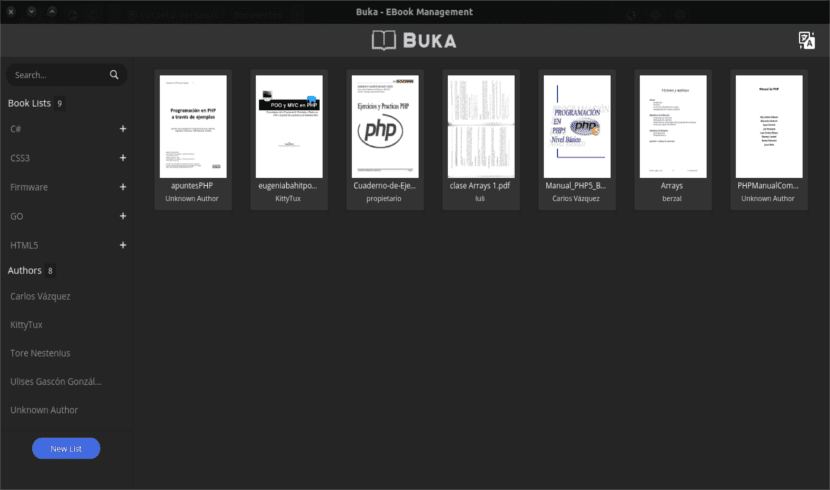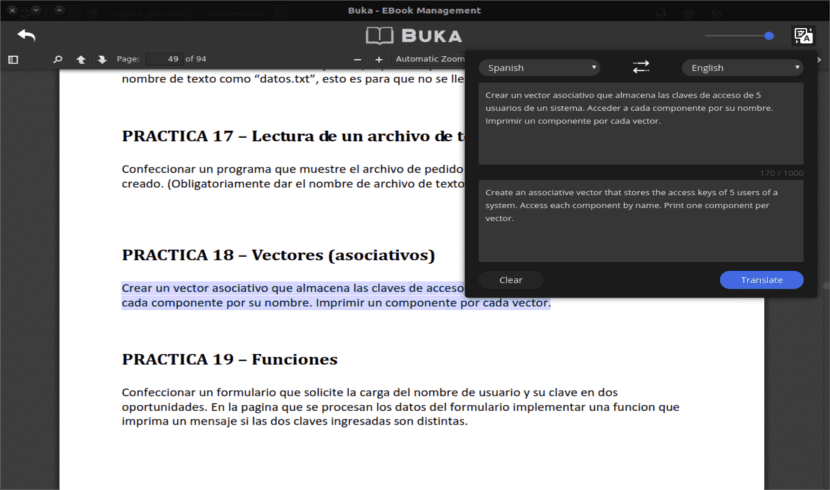
In the next article we are going to take a look at Buka. Have you been looking for a e-book manager for your desktop? If you are a lover of reading, this application may be very interesting for you. This will allow the user to keep his collection well organized.
Muchos eBooks, particularly textbooks and manuals, come as PDF files. In Ubuntu we find by default a basic pre-installed PDF viewer that many find scarce. Buka is an application for the reader who is dedicated and designed to help users focus more on the content of your readings.
Buka is an application that through a simple and clean user interface It will be very useful for us to organize the books in PDF that we have stored in our digital library into thematic collections. The Buka reader achieves that user can concentrate on the content of their readings. Among other things, it will also allow us to obtain a fast translation of text fragments.
This eBook manager is a open source app relatively new designed for reading and managing PDF e-books. Although it is not the most popular reader, Buka is a compelling PDF reader application for Ubuntu with some useful features.
General characteristics of Buka
In order to support an improved reading experience, Buka adds support for PDF file configurations that will help us to focus more on the content and less on the toolbars of the peripheral application of turn would show us.
The app has a search panel With which we will be able to filter the search results by genre of books, author and type of context.
It will also give us the opportunity to choose how clear we want our program theme, until we reach a dark theme.
Buka allows the user to move between the pages of a PDF using the arrow keys (or the buttons on the toolbar). Will allow us adjust page zoom. It will also give us the possibility to see 2 pages at the same time and to search for text in the documents.
If during your reading you need it, you will also be able to rotate individual pages of a PDF.
To manage your PDF files Buka allows you to create separate lists. An example of what you will be able to do would be 'PHP', 'Java', 'Ubuntu', etc. We can move between all of them in a very simple way.

But my favorite characteristic, like that of all those who, like me, do not speak other languages, is the built-in translation tool. This function is totally dependent on the network (so it won't work without internet). When you have the internet, this option is very useful for us to quickly translate text fragments or phrases in documents that are not in our native language or in another that we master.
This software, which is licensed under MIT.
Install Buka on Ubuntu 16.04 64bits
There is a variety of methods to install Buka But the one I'm going to show is through Snap. To install Buka as a quick app, enter the following code in a new terminal window:
sudo snap install buka
Another option to install this program is to download buka_1.0.0_amd64.snap from the Buka versions page. There you can find the packages .deb, AppImage, etc. In my case I will use the package that I have indicated above. To do this, you have to run the following command to install it from the terminal (Ctrl + Alt + T). These orders must be executed from the directory where we have saved the file that we have just downloaded.
sudo snap install buka_1.0.0_amd64.snap buka
With the last command we will launch the program. We can skip it and look for the program in the Dash of our Ubuntu. The other option to install this application is where you can install it directly from the Software Center clicking the next link.
Uninstall Buka
If you have already tired of this application, you can easily uninstall this application. We will only have to open a terminal (Ctrl + Alt + T) and write the following in it:
sudo snap remove buka
Buka is a free application to download and it is also open source. Whoever wants and can can contribute their source code through their home page. GitHub.
A small curiosity, why do you install it with snap packages if it is in the .deb version? It is just a small curiosity.
Hello. As you say, you have the possibility of using a .deb for the installation. The only reason I can give you is that using the Snap package is that it includes all the dependencies in one package.
This brings many advantages, such as that it can be installed on any Ubuntu regardless of its version (from 16.04 onwards).
To this is added that by not using the system libraries, the ones it uses are isolated from the rest, making them more secure packages than the rest because they do not alter your system.
These are the reasons why a snap package and not .deb. But in this case using the .deb package is not a bad idea either. Salu2.
Jose Daniel Vargas Murillo
Shit that doesn't read epub. Greetings.